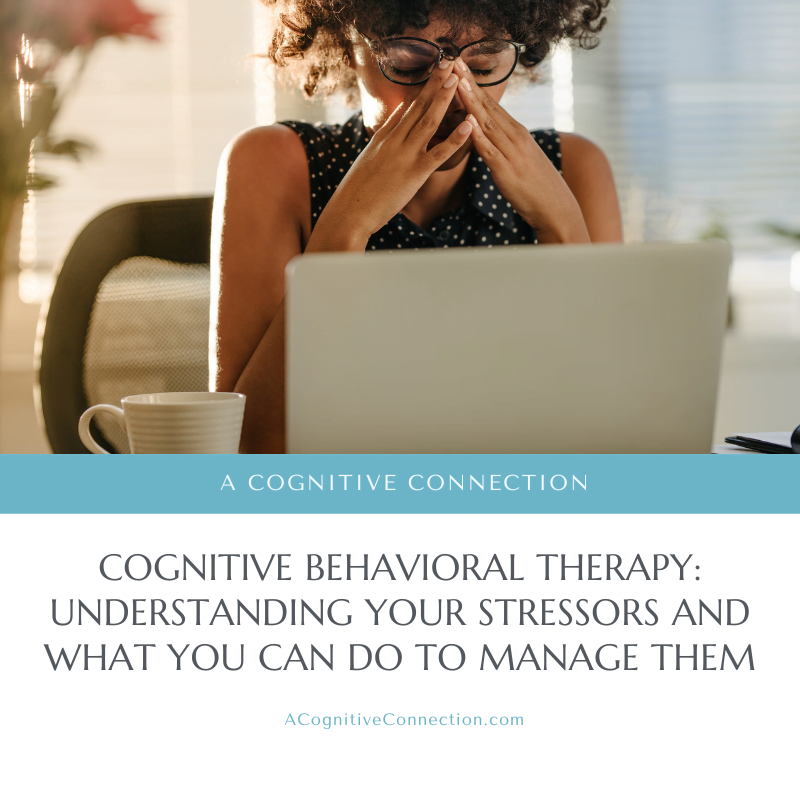There are few people in this world who don’t experience anxiety in their lives. Whether it’s financial fears, social struggles, or political puzzling, worry follows most of us around like an old, long, unwanted friend. If you wake up in the morning with a clear head only for all your stress to come crashing in, you’re not alone: over 31% of all adults experience an anxiety disorder. Tragically, excessive anxiety causes not only mental suffering but physical pain as well. Let us show you how cognitive behavioral therapy can help!
Now, not all anxiety disorders are made equal, of course. Some are more intense than others, and all center heavily on a person’s specific stressors. What drives one individual into a panic attack will roll off someone else’s back. In this way, stressors can be surprisingly diverse and hard to predict. For many people, getting to the bottom of their stressor is a long process of self-discovery. However, understanding them can help make recovery a smoother, safer path.

A Cognitive Connection uses cognitive behavioral therapy to help you identify your stressors and find ways to cope with them that work. Knowing where your anxiety begins (and how to fight it) is critical to living a happy and healthy life. It’s not necessarily easy to do, but it is within the reach of anyone willing to search their souls. So, read this article to learn more about this process and the powerful ways you can give yourself the gift of relief.
What Are Stressors? How Do They Impact You?
As defined by Medical News Today, a stressor is “…any event, situation, or external stimulus that causes a stress response in the body.” Before we define stressors any further, let’s examine the phrase “stress response” a little deeper. The stress response triggers heavy changes in the mind and body, chemically and physically. It starts when the body detects danger and sends a distress signal to the hypothalamus, triggering a “fight or flight” reaction.
When this response triggers, your heart rate and blood pressure will increase. You’ll breathe more rapidly, and your muscles will tense up. Furthermore, your mind may start racing with a thousand thoughts simultaneously. So, racing heart, jagged breathing, muscle pain, and disconnected thoughts sound familiar? These are all classic symptoms of a panic attack. Though this reaction has helped us survive for millions of years, it’s devastating to experience.
Unfortunately, modern life is filled with stressors that trigger the stress response. Rising gas and food prices cause financial fears. Societal changes produce panic attacks in those afraid to be left behind. Social and psychological disorders can make anxiety and fear harder to handle. All these stressors work together like instrumentalists in a symphony to produce a cacophony of worry that can derail lives. Recovery starts by using cognitive behavioral therapy to identify where your stressors begin and end.

The Most Common Stress Triggers for Many People
If you’ve ever sat down and talked with others about what bothers you, you’ve likely discovered that the two of you share at least some fears. However, you also probably both worry about things that surprise the other person. That’s what makes anxiety so challenging to manage: there are as many stressors as there are people. However, the most common anxiety triggers often fall into specific categories that make them easier to diagnose, such as:
- Finances: Unless you’re independently wealthy, you probably constantly worry about your financial health. It’s one of the most common stressors in today’s fast-paced world. Fears of keeping a job often compound with anxiety about missing bill payments.
- Personal Injury: Have you ever been stuck in rush hour traffic and suddenly panicked about getting into a severe crash? People naturally fear physical injury and pain, but some people let this anxiety spiral out of control and take over their lives.
- Loss of a Loved One: Everyone has friends and family who mean the world to them. As we get older, though, we start fearing losing them. Sometimes, this anxiety can become an overriding concern and produce, unfortunately, excessive stress.
- Heavy Workload: Is your job so demanding you sleepwalk through the day chugging coffee to lift your brain fog? Excessive work is literally killing nearly one million people every year and is one of our country’s biggest problems right now.
- Relationship Problems: Struggles in friendships and romances can cause high anxiety that may intensify these issues. For example, a simple debate over what to watch on television could trigger a panic attack that transforms it into a serious fight.
Now, before trying to eliminate all stress from your life, let’s step back for a minute and examine some good stress. Wait, what? How can stress be good for you? Some stressors can be significant as long as they help you grow as a person and improve your life. For example, we all feel anxious when preparing a new job resume. However, that worry can help us focus on creating the best possible version of ourselves to share with an employer to stand out.
In this way, positive, manageable stress is a powerful tool that helps people build their lives and succeed. That said, even “good” stress can get out of control if we don’t manage our stressors properly and reduce our fears. Thankfully, our team at A Cognitive Connection can teach El Paso County residents stress management techniques that truly work. These tools let you take control of your anxiety and learn how to live in Colorado Springs as happily as possible.

How To Manage Your Stressors and Anxiety Safely With Cognitive Behavioral Therapy
Stress management is a complex process that requires deep personal understanding. Just as importantly, knowing your stressors can help you identify related physical and cognitive problems that may worsen your symptoms. For children, learning about their stressors can help direct behavioral treatments effectively and reduce their symptoms exponentially. In a very real way, anxiety relief starts with you and requires constant diligence about your stressors to defeat.
Thankfully, you can learn to handle your stressors by a) knowing what triggers your anxiety, b) avoiding stressors whenever possible, and c) utilizing powerful coping strategies. A Cognitive Connection has helped many El Paso County residents build a complete toolkit for fighting stress and anxiety at its source. In this way, you or your children can stay calm, reduce your suffering, and make life much easier. Just a few techniques to consider include:
- Deep Breathing: When we step back from our stressors and take a few deep breaths, we almost always feel better. That’s because anxiety speeds our breathing and worsens oxygen flow. Slow breaths provide more oxygen in your blood to clear your head.
- Meditation: Taking five minutes daily to sit, close our eyes, and calm our minds can provide immeasurable health benefits. You don’t have to do an astral projection or meditate for hours to calm your mind. Just walk away from your stressors for a minute.
- Social Support: Talk with trusted friends and family members to build a coping network for your anxiety. These should be people who will take your stressed-out calls at all hours to calm you down and manage your out-of-control stress with you.
- Healthy Living: Eating a more nutritious diet, exercising regularly, quitting smoking, and limiting alcohol can significantly relax your mind and body. While it might not manage some stressors, living a healthier life can more successfully relieve general anxiety.
- CBT: Cognitive behavioral therapy (CBT) can help with anxiety and depression by teaching you better emotional behaviors. Though our team can help you through this process, a little self-care works wonders between sessions with our therapists.
- Problem-Solving Coping: Problem-solving coping tasks you with understanding and managing your stressors by fixing the issues they cause. Often, this method works best for people with analytical minds who know how to get things done.
- Emotion-Focused Coping: Emotion-focused coping involves analyzing your stressors and responding to them positively or through reappraisal. In other words, you learn to make the best of a good thing by using it as an emotional learning tool.
- Meaning-Focused Coping: Like emotion-focused coping, meaning-focused techniques strive to find a purpose for your stress and experience. People with spiritual minds often find this method works best for their needs.
Ways A Cognitive Connection Can Help You
If you need a little more help identifying and managing your stressors in Colorado Springs, A Cognitive Connection is here for you! Our services focus on supporting emotional and behavioral health in a person-centered way. We carefully tweak all our treatments to support our patients, giving you or your child the best chance of identifying stressors and managing anxiety successfully. Just a few service options that our team can provide include:
- Cognitive Brain Training: This innovative program helps to rebuild neural networks in the brain to improve your function and performance. When used to manage anxiety, this process rebuilds coping mechanisms you’ve forgotten to boost your recovery.
- V.I.B.E.S.: The Vibrational Individualized Body Enhancement System (V.I.B.E.S.) from Bioharmonic Technologies uses sound, frequency, vibrations, and other energies to awaken the nervous system, help the body heal, and improve anxiety therapy.
- Mind’s Eye: Mind’s Eye is a powerful system from Theta Technologies that uses light and sound to create a deep relaxation state. By calming their minds and temporarily separating from their stressors, people often visualize life goals and fall asleep quickly.
- Behavioral Assessment and Counseling: Does it feel like you keep experiencing the same stressors repeatedly, almost out of your control? People are creatures of habit and behavior; our assessments and counseling can help you manage them.
Just as importantly, we provide events such as parenting classes, individualized tutoring, and cognitive/social skills sessions that can help parents manage their child’s anxiety and behavioral problems. After all, parental stressors almost always focus on keeping their children healthy. You can also contact us to get answers to questions about our services, such as our financing options and whether we accept payment through your child’s special education program.

Our Team at A Cognitive Connections Is Here for You!
Identifying your stressors and creating powerful coping tools using cognitive behavioral therapy are just the first steps in your recovery. Persistence, patience, and self-respect can help make this process easier and ensure you manage your anxiety successfully and safely. If you feel like you need a little more help through this complex process, call A Cognitive Connection at (719) 358-6637 to set up your appointment. We can help Colorado Springs residents through their life challenges.


